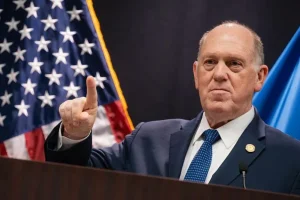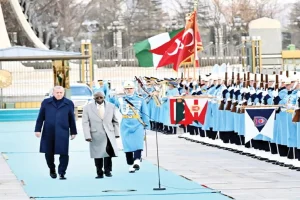ABIDJAN, IVORY COAST – Ivorian President Alassane Ouattara has announced his intention to seek a fourth term in October’s presidential election, a decision that has immediately drawn sharp condemnation from opposition leaders. The 83-year-old leader stated that his health was not a concern, and his candidacy was driven by a need to “preserve national stability amid ongoing security and economic challenges.”
President Ouattara argues that a new constitution, approved in 2016, effectively reset his two-term limit, thereby allowing him to stand again. However, this interpretation is highly contentious and has been a source of significant political tension.
His bid comes as several prominent potential challengers have already been barred from the race. These include former President Laurent Gbagbo, ex-Prime Minister Guillaume Soro, and former minister Tidjane Thiam. On Tuesday, Mr. Thiam and other opposition figures swiftly denounced Ouattara’s announcement.
“Today’s announcement by Mr Ouattara constitutes a violation of our Constitution and a new attack on democracy,” Mr. Thiam said in a statement. He added that “the Ivorian people will continue to make their voices heard and show the world what we think of this situation.”
On the same day as Ouattara’s announcement, authorities banned a peaceful protest planned for August 7. The demonstration had been organised by opposition groups to demand the reinstatement of disqualified presidential candidates and an independent audit of the voter list.
President Ouattara, a former banker, will likely be the frontrunner in the poll. His supporters point to his economic track record, with Ivory Coast’s economy having grown by more than 6% for four successive years. However, the country is currently experiencing widespread disillusionment with its political establishment.
Concerns are high that the current tension over the exclusion of opposition candidates could evoke memories of past electoral violence. This includes the 2010-2011 conflict, which resulted in over 3,000 deaths, and the unrest triggered by Ouattara’s controversial third-term bid in 2020. More than 8.7 million Ivorians have registered to vote. Civil society groups and religious leaders, including the Catholic Bishops’ Conference, have expressed alarm at the growing political polarisation in the country.





Add Comment